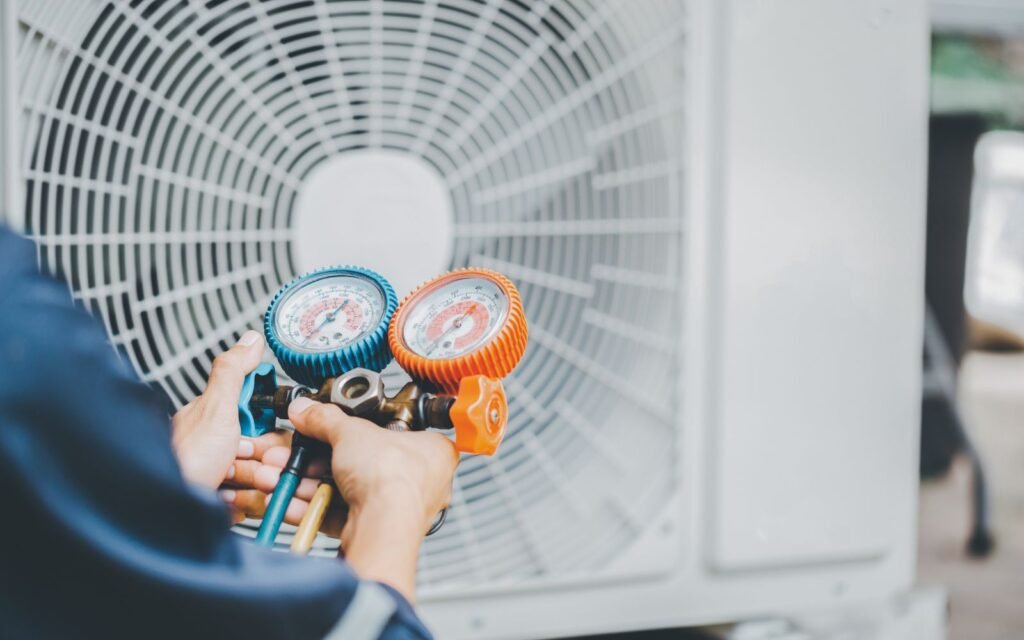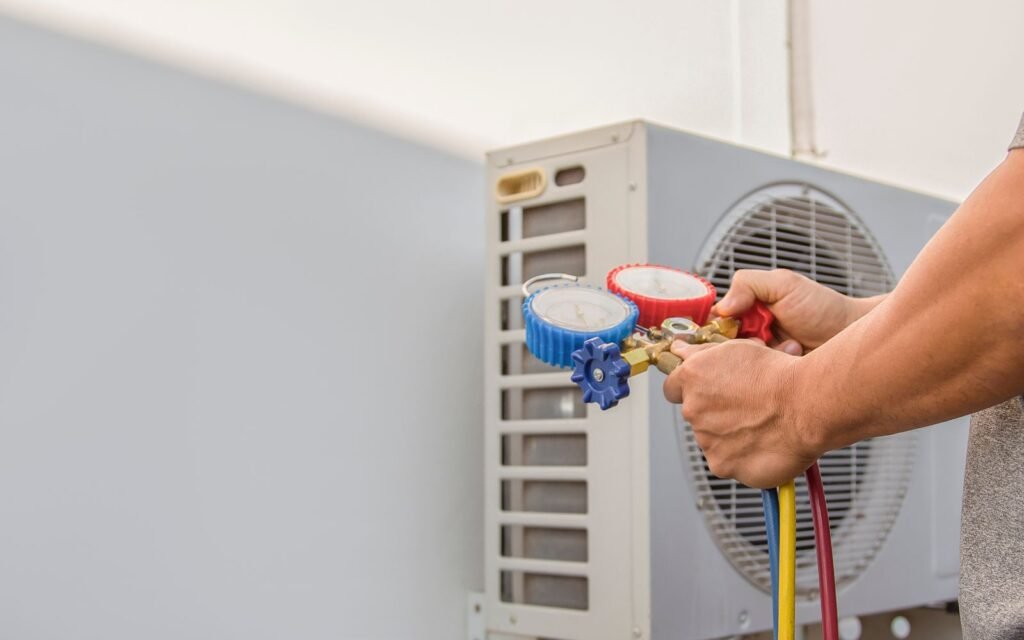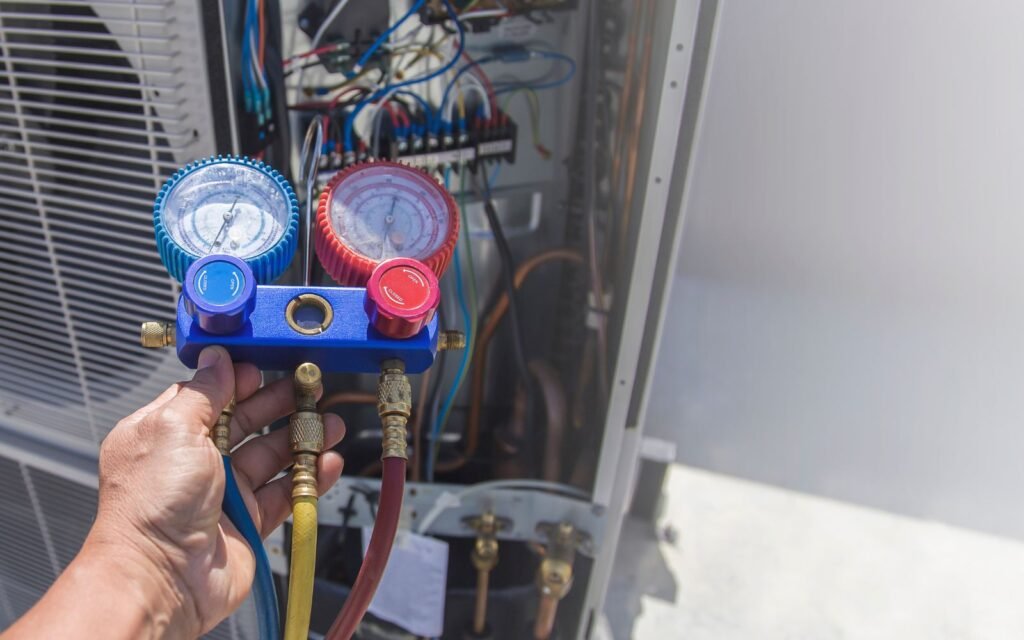Let’s talk about air conditioning. It’s our best friend during those sweltering summer days, but have you ever wondered what powers these cool machines? A common question is, “Does air conditioning use gas?” A lot of people are curious about this. To clarify, let’s dive into the different types of air conditioners and the role gas plays in their operation.
Table of Contents
ToggleWhat Are Different Types of Air Conditioners?
The answer to the common question does air conditioning use gas or electricity? is hidden in understanding types of HVAC units. When it comes to air conditioning, there are two main players in the game: electricity and gas.

Electricity-Powered Air Conditioners
First, most of us probably have electric air conditioners in our homes. These units use a compressor, refrigerant, and fans to keep our spaces nice and cool. Notably, electric air conditioners are super popular because they’re easy to find and usually pretty efficient, especially for residential use.
Gas-Powered Air Conditioners
On the other hand, let’s talk about gas-powered air conditioners, also known as absorption chillers. These systems use natural gas to do their cooling magic. You’ll typically find them in larger commercial buildings or industrial settings. In fact, in places where electricity is pricey, gas-powered units can actually save you some money. So, when considering your options, does air conditioning use gas? Yes, some systems do, but mostly in commercial settings.
Does Air Conditioning Use Gas?
Here’s the quick answer: Yes, some air conditioning systems do use gas! Essentially, gas-powered air conditioners use natural gas to drive the cooling process, and they’re generally found in commercial settings or areas where electricity costs are sky-high.

This brings us back to our question: does air conditioning use gas? It depends on the type of system you’re looking at. Chances are, it likely doesn’t if it’s a residential unit.
How Do Gas-Powered Air Conditioners Work?
You might be curious about how gas-powered air conditioners work, especially since they don’t use the same system as electric ones. In contrast, instead of a typical compressor, they rely on something called an absorption refrigeration cycle. To elaborate, here’s a breakdown of how gas-powered AC units use gas to cool your place:
- Thermal Energy Generation: When you turn on the system, it burns natural gas to create heat, thereby kicking off the cooling process. As a result, this initial step sets everything in motion.
- Refrigerant Circulation: The heat increases the pressure of a refrigerant, which then moves through the system. Furthermore, speaking of refrigerants, this is a crucial part of how the air conditioner operates. In addition, the circulation is vital for maintaining efficiency.
- Heat Transfer: The refrigerant goes into the condenser, thus releasing heat outside and cooling itself down. Consequently, this process ensures that the air conditioner can effectively cool your space.
- Evaporation: Subsequently, the refrigerant enters the evaporator, where it absorbs heat from the indoor air, cooling your space. Moreover, this step is essential for achieving the desired temperature.
- Absorption and Recycling: Finally, the now-cooled refrigerant gets absorbed and sent back to the generator to start the process all over again. Therefore, this cyclical process allows for continuous cooling efficiency.
Unlike electric air conditioners, since gas-powered systems use thermal energy, they can be more efficient and even repurpose waste heat when it’s chilly outside.
What Are The Pros & Cons Of AC That Use Gas?
Air conditioning that use gas definitely have some great benefits, but there are a few challenges to think about too. Let’s dive into what you can really expect from these systems in terms of efficiency and how practical they are for everyday use.

Pros of Gas-Powered Air Conditioning
- Cost Savings: If you live in an area with high electricity prices, going with gas could save you money over time.
- Backup Power: These systems can still work during power outages, which is a big win.
- Efficiency: Gas units can be more efficient for heating and cooling larger spaces, making them great for commercial use
Cons of Gas-Powered Air Conditioning
- High Installation Costs: Getting a gas-powered system set up usually costs more upfront cost than electric options.
- Maintenance Complexity: Gas systems need a bit more TLC when it comes to maintenance, and repairs can be trickier.
- Fuel Availability: Depending on where you live, getting natural gas or propane might not be an option, making a gas system less practical.
Differences Between Electric & Gas-Powered Air Conditioning
Now that we know the answer to does air conditioning use gas let’s break down the key differences between electric and gas-powered air conditioning. This will help you figure out which option might be the best fit for your needs.
|
Electric Air Conditioning |
Gas-Powered Air Conditioning |
| Runs on electricity |
Runs on natural gas |
|
Lower installation costs |
Higher installation costs |
| Easier to maintain |
Requires more maintenance |
|
More efficient for smaller spaces |
Better for large spaces |
| Higher carbon footprint |
Smaller carbon footprint in some cases |
Which One Should You Choose Between Gas or Electric AC?
So, how do you decide between gas and electric? It really depends on a few factors:
- Location: If you live in an area with high electricity prices or unreliable power, gas might be your best bet.
- Energy Efficiency: For most homes, electric units tend to be more efficient, while gas-powered systems shine in large commercial settings.
- Cost Considerations: Think about installation costs, potential energy savings, and maintenance needs.
- Environmental Impact: Additionally, consider the source of your electricity and whether natural gas is accessible in your area.
Can You Tell If Your Air Conditioner Uses Gas or Not?
Curious if your AC unit runs on gas or electricity? Let’s break it down together! Here’s how you can figure it out:
- Check the Unit Type: First things first—what kind of AC do you have? If it’s a central system, chances are it’s electric. However, if you’re dealing with a small window or portable unit, that’s almost definitely electric too!
- Look for the Energy Source: Now, take a peek at your unit. If you see a gas line hooked up, you might have a gas-powered AC. On the other hand, if it’s just electrical wiring with no gas in sight, it’s probably electric.
- Review the Manual: Next, do you still have the user manual lying around? That little booklet usually has all the info you need about what powers your AC.
- Inspect the Outdoor Unit: Additionally, if you have a central air system, check out the outdoor unit. Gas-powered ones might have extra bits like a gas burner, while electric systems typically just feature a compressor and some fans.
- Check the Model Number: Not sure yet? In that case, look up the model number online. A quick search will usually lead you to all the specs you need.
- Call Professional: Finally, if you’re still not sure, just give an HVAC (Heating, ventilation, and air conditioning) pro a call. They can sort it out for you in a jiff!
Hopefully, now you can surely say does air conditioning use gas or not at your place.
Conclusion
To wrap it up, while gas-powered air conditioning systems are out there, most homes and smaller businesses stick with electric units. Air conditioning using gas is more commonly found in larger buildings or in areas where electricity is limited or costly. Ultimately, whether you choose gas or electric comes down to your location, budget, and energy needs. Understanding these differences will empower you to make the right choice for your cooling needs! So the next time you hear someone ask, “Does air conditioning use gas?” you’ll have a solid answer!
FAQs
1. Is it more economical to run gas or electric air conditioning?
This depends on various factors, including local energy prices, the efficiency of your system, and your specific cooling needs. Evaluating your utility bills and system efficiency can help determine the most economical option for you.
2. What maintenance is required for gas air conditioning systems?
Gas air conditioning systems require regular maintenance, including checking gas lines for leaks, cleaning filters, inspecting the combustion chamber, and ensuring that ventilation systems are clear and functioning properly.
3. Are there any safety concerns with gas air conditioning systems?
Yes, safety is important. Regular inspections are necessary to prevent gas leaks and carbon monoxide buildup. Ensuring proper ventilation and having carbon monoxide detectors installed are crucial for safety.







